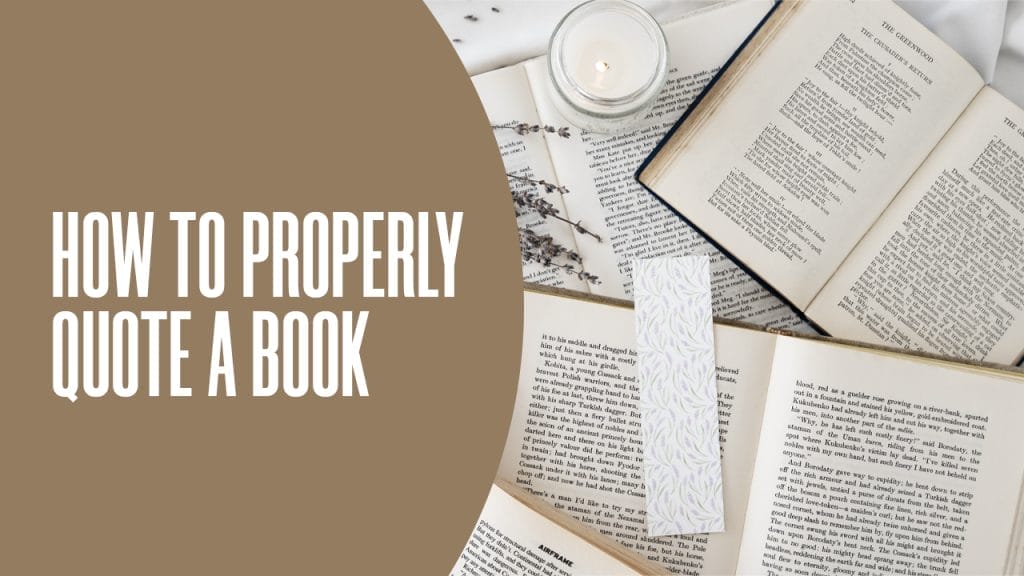
Citing a quote can be a mark of respect for the original author’s eloquent expression—adopting their words to enrich your own work. Done with attention to proper attribution, it acknowledges the value of their contribution to your narrative. But are you confident you’re doing it with the integrity it deserves?
Key Takeaways
- Understand the importance of accurate quoting
- Learn the proper techniques for citation
- Gain access to resources that streamline quoting practices
Understanding How to Accurately Attribute Quotations from Books
The Significance of Quoting with Precision
Respecting copyright and intellectual property, you enhance both the legal and ethical standing of your work. As you acknowledge others’ contributions, you also bolster the reliability of your own content. Remember, a careful citation is more than a formality; it reinforces your commitment to academic honesty and the golden rule of treating others’ work as you would wish yours to be treated.
You strengthen your arguments when you incorporate authoritative voices from relevant literature. Incorporating the insights of others shows you’ve engaged deeply with the topic and are presenting a well-considered perspective.
Citing A Book: Principles For Accurate Attribution
Choosing a Quotation Style
Select a citation style according to your field of study or the publication’s requirements. Whether it’s APA for the social sciences, MLA for humanities, or the Chicago style for a variety of purposes, each format has precise rules for quoting sources effectively.
APA Style Direct Quote Example:
“Here’s a direct quote” (Johnson, 2016, p. 52).
MLA Style Direct Quote Example:
“Here’s a direct quote” (Johnson 52).
Chicago Style Direct Quote Example:
“Here’s a direct quote” (Johnson, 2016, 52).
Formatting Quotes and Citations
Depending on the length, format quotes using quotation marks for shorter excerpts or indented blocks for longer passages. Remember to include relevant details like the author’s last name, publication year, and page numbers, as detailed by the citation style you’re using.
Paraphrasing and Summarizing
When you reword an author’s ideas in your own style, that’s paraphrasing. Summarizing condenses the main points into a brief overview. Both require citations, as the ideas originate from another person’s work.
Steering Clear of Quoting and Citation Errors
Remain vigilant about punctuation when quoting; periods and commas should be inside the quotation marks. Accuracy in quoting demands that every comma, period, and citation appears in its rightful place to maintain readability and prevent miscommunication.
Maintain the integrity of quotes by verifying their sources before inclusion. Misattribution can undermine your credibility. Use digital tools like Google Books or Wikiquote to confirm quotations and attribute them correctly.
Always attribute quotes to avoid accidental plagiarism. Using someone else’s words without proper credit can have serious consequences and impugn your integrity. Remember to employ a consistent format for in-text citations and full references in the bibliography to comply with academic standards.
Quoting from literature enriches your work, imbuing it with depth and authority. Follow these guidelines to cite with confidence and navigate the nuances of academic integrity with ease.
Guides on Correctly Citing Literature (MLA and Chicago Style)
Recognized Styles:
- Modern Language Association (MLA)
- American Psychological Association (APA)
- Chicago Manual of Style (CMS)
Notable Differences:
- MLA primarily used for humanities.
- APA preferred for sciences.
- CMS suitable for broad range of subjects.
FAQs:
- MLA or APA? Humanities often use MLA, while APA is for sciences.
- CMS relevance? Offers flexibility across various subjects.
Formatting Essentials:
- MLA: Author’s last name, first name. Book Title. Publisher, Year Published.
- APA: Author’s last name, initials. (Year Published). Book Title. Publisher.
- CMS: Author’s last name, first name. Book Title. City of publication: Publisher, Year Published.
Suggested Literature
For Nonfiction Authors:
- Navigating Common Errors in Drafting
- Mastering Self-Review Techniques
Enhance Your Editing Skills:
- Recognize and Fix Typical Writing Slip-ups
- Implement Effective DIY Revision Strategies
Common Inquiries Regarding Book Quotations
APA Style Book Quotation Formatting
When quoting from a book in APA style, include the author’s last name, publication year, and page number in parentheses after the quote. For example, (Smith, 2020, p. 152).
Incorporating Book Quotes into Essays
To integrate a direct quote, introduce it with a signal phrase, such as “According to Smith (2020),” followed by the quotation and a parenthetical citation.
Citing Book Titles in Text
Italicize the title of the book within the essay text. Also, capitalize the major words of the title, for instance, The Great Gatsby.
Referencing Direct Quotes from Individuals in Scholarly Writing
For a direct quote from a person, include their name, the year, and the page number if available, much like a book citation. Example: (Doe, 2021, p. 45).
In-Text Citation Example
When citing within the body of an essay, you might write, “It is noted that ‘the data reflects…’ (Smith, 2020, p. 152).”
Attributing Quotes from Books in Academic Work
To correctly attribute a quote from a book:
- Introduce the quote with the author’s name
- Include a citation after the quote
- Add the full citation in the reference list at the end of your paper
| Step | Description |
|---|---|
| Introduction | Mention the author’s last name and the work’s year. |
| In-text Citation | Provide the page number where the quote can be found. |
| Final Reference | List complete book details in your work’s bibliography. |
Resources for How to Properly Quote a Book
- Modern Language Association (MLA)
- American Psychological Association
- Chicago Manual of Style
- APA vs MLA – The Key Differences in Format and Citation
Leave a Reply